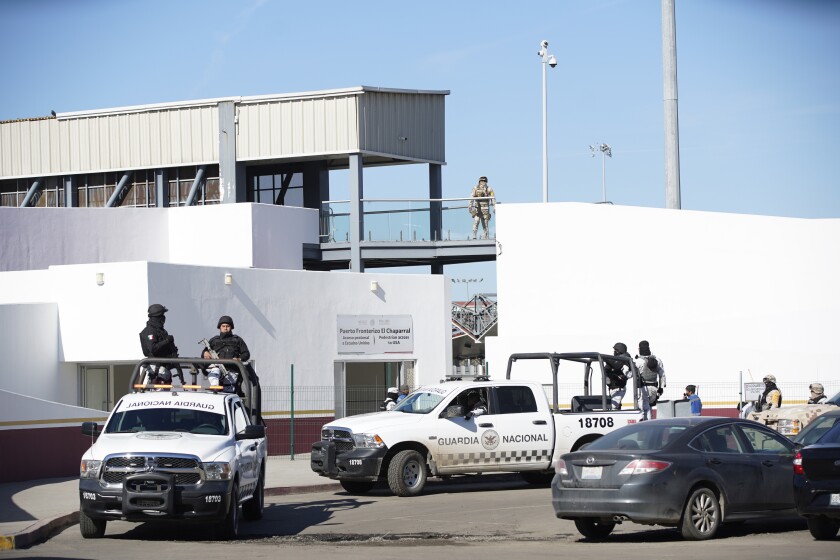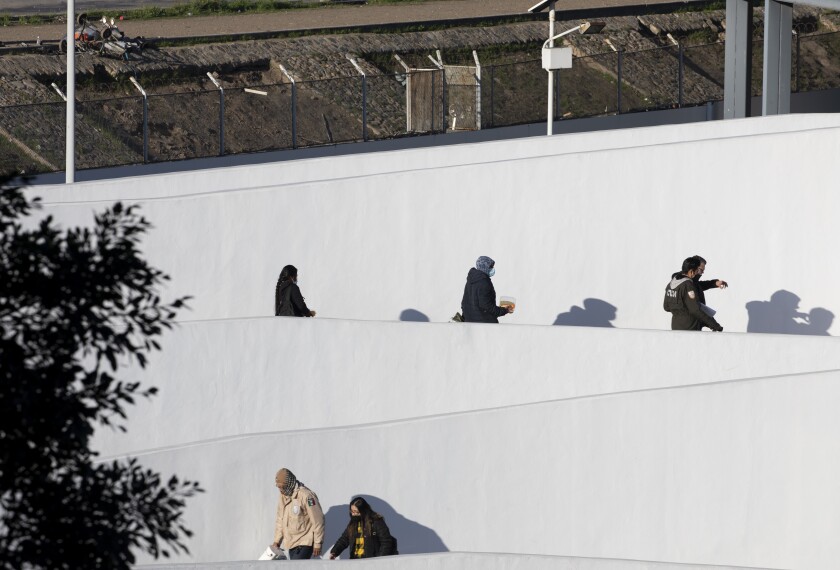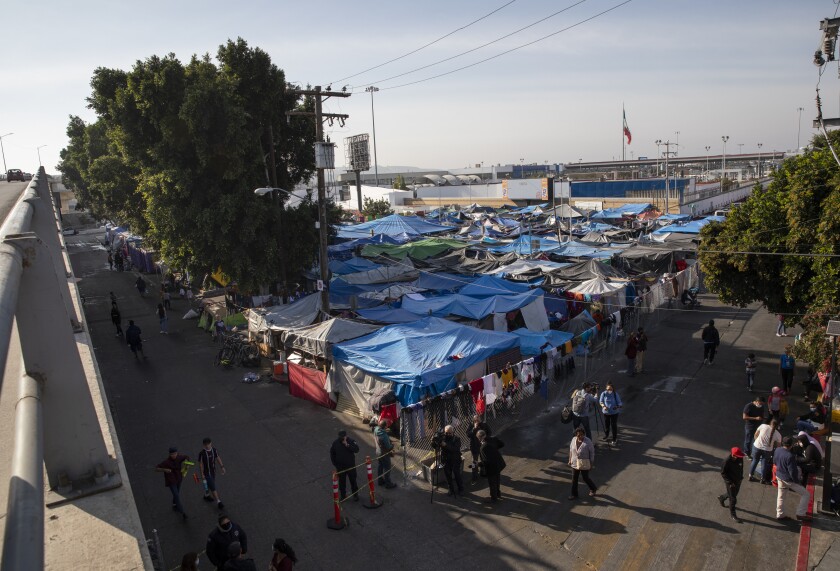Despite the Biden administration’s assurances that it has made changes to the “Remain in Mexico” program to address humanitarian and due-process concerns, the experiences of the first two people returned to Tijuana under the restart included many of the issues that plagued the program under the Trump administration.
In what is perhaps a small, telling window into how the implementation is going, the Spanish word for “migrant” was misspelled in the title of one of the documents of instructions that the men were given.
Beyond this and other paperwork errors, officials have already violated rules that were meant to make the program less harmful in its second iteration.
Though Biden administration officials promised access to counsel, the two Colombian men were not allowed to speak with attorneys while in U.S. custody. Officials also failed to vaccinate one of the men for COVID-19. Confused and terrified, the two men found themselves back in Tijuana with the extra stigma of being the first returnees.
“We’re the two from Colombia,” one of the men said in Spanish. “Everyone knows we’re them. We already have problems.”
The Union-Tribune is not publicly identifying the men or their location because of their fear that the people they fled will come looking for them. The men are also concerned that, as the first two people returned to Tijuana, they’ve been made especially vulnerable as targets.
Known officially as Migrant Protection Protocols or MPP, the program requires asylum seekers to wait in Mexico while their immigration court cases proceed in the U.S. It came under heavy criticism when it was first implemented under the Trump administration because of the danger in which it placed already vulnerable migrants. Many were assaulted, kidnapped or worse, sometimes as they left a port of entry or attempted to return to one for a court hearing.
MPP also made finding attorneys — who are instrumental in navigating the complexities of proving an asylum case — especially difficult for those enrolled.

Mexican Guardia Nacional vehicles parked at the Chaparral Plaza in Tijuana.
(Alejandro Tamayo/The San Diego Union-Tribune)
President Joe Biden campaigned on ending the program and did so in his first year in office. But the states of Texas and Missouri challenged the way the program was ended in federal court, and a judge sided with the states, ordering the program’s return.
As of Friday, 237 people have been returned to Mexico under the restart, mostly in El Paso, Texas, where the program began in December, according to the U.N. migration agency. In Tijuana, 11 have been sent back. The Tijuana returns include two women, according to Alex Mensing of Innovation Law Lab.
Though the Biden administration maintains that it is only bringing the program back because it has to, critics have pointed to an expansion of nationalities eligible for the program as a sign that the administration is using the judge’s order as an excuse to further the United States’ longstanding agenda of deterring asylum seekers rather than working to create a humane asylum system as promised during the campaign.
Neither the Department of Homeland Security nor Customs and Border Protection responded to a request for comment about the issues identified by the two men.
The two men, who have been friends since childhood, said that they hadn’t planned to leave Colombia but fled late last year because their lives were suddenly in danger. They did not want to speak publicly about the details of what happened to them because they were afraid they would be identified or that their asylum cases would be affected.
According to a U.S. State Department report, human rights concerns in Colombia include unlawful and arbitrary killings as well as reports of torture and arbitrary detention by both government and criminal forces. Border Patrol agents caught more than 3,300 Colombians crossing into the United States in November, the most recent month with CBP data available. That’s roughly 2 percent of the people apprehended that month.
The end-of-year holidays are an important time to be with family, one man said, and he wouldn’t have chosen to leave the country at that time without being forced.
They traveled by plane, flying to several Mexican cities before arriving in Tijuana. The journey took only a couple of weeks. While in Mexico, they paid to stay in a hotel where they felt safer, and they did not go out.
“That’s what worries us,” one man said. “We’re really afraid to be in Mexico. There’s no difference between Mexico and Colombia.”
Between the flights and hotel rooms, they spent all of the money that they had. In doing so, they avoided many of the harms that many asylum seekers risk on the journey by foot and bus to the U.S. border. They believed that once they reached U.S. soil, they would be safe, so the temporary expense seemed worth it.
They planned to live with the wife of one of the men, who is a green-card holder in the U.S. She had already been planning to sponsor her husband’s green card in the coming years, but because of the urgency of the situation he found himself in, those plans changed.
When they were apprehended by Border Patrol the day before New Year’s Eve, they did not know that the Remain in Mexico program was restarting.

An official with El Instituto Nacional de Migración walks with others out of El Chaparral port of entry into Tijuana.
(Ana Ramirez/The San Diego Union-Tribune)
Agents took them to a station and placed them in a cell packed with dozens of other men. There were only six bunk beds, the men said, so they slept on the floor, sandwiched among all of the people in custody. Because the lights were always on in the cell, they struggled to keep track of time.
Though they do not speak much English, they realized that agents were speaking badly about them, they said. They recognized words like “stupid” and phrases like “go back to your country.”
The experience, one man said, amounted to psychological abuse.
They were not given an opportunity to bathe or shower while they were in custody, they said, though they were there for nearly a week.
According to the documents they were given, they signed documents related to MPP on Monday, after they’d already been in the cell for several days. The men said they didn’t know what they were signing, that many of the documents were in English and even for the documents in Spanish, they were not given time to read them before signing.
After they’d been selected for MPP, an agent asked if they were afraid to go back to Mexico. The men said another agent tried to keep that official from asking the question, which is now a required question under the new rules for the program before someone can be returned.
“He said we would have to spend more time in those conditions,” one man recalled.
They told the agent that they were terrified.
The new rules say that if someone expresses fear of return to Mexico, they should have 24 hours to get in touch with an attorney before they speak with an asylum officer. Though the men waited the required time period before that interview, they were not allowed to make any calls or otherwise access legal counsel, they said.
The man whose wife is in the United States said that he asked to be able to call her because she could get an attorney for him, but officials denied that request.
Documents from the asylum officer’s interview corroborate the men’s claims that they didn’t have access to attorneys and that they were forced to sign paperwork that they did not understand.
They said an agent told them that no matter what happened, they would be sent back to Mexico. So, when the asylum officer asked if they wanted to wait longer in custody in order to access attorneys, the men waived that right, not wanting to spend more time in the crowded cell with their fate already decided.
On their own, the men were not able to explain their fears in a way that met the legal requirement to get out of the program.
The document indicating the questions asked and the asylum officer’s summary of the responses received seemed to indicate that though the men are extremely fearful that their persecutors will find them in Mexico, because they were able to survive in hiding in Mexico for the two weeks that they were there, they did not qualify for exemptions to the program. They told the asylum officer they are now out of money and unable to pay for a hotel.
“We told them that we would not go out because we are scared, but how can we not go out for six months?” one man said.
Agents also made errors in the men’s documentation — a common issue in the first iteration of MPP.
The men were initially scheduled for court hearings months in the future — which likely would have pushed their cases well past the six-month limit imposed by Mexico in this iteration of MPP. When they told the asylum officer this, their hearings were rescheduled for February. However, one of the men’s English-language documents still indicates that his court hearing is in May though the Spanish-language version of the document says February.

Hundreds of migrants go about their lives in a camp near the port of entry at Tijuana’s Chaparral plaza. Many are waiting to be able to request asylum in the United States.
(Ana Ramirez/The San Diego Union-Tribune)
Additionally, pages of the men’s documents with their personal information were mixed up. Each man had the first page of the other’s court notice.
Those court notices do not indicate an address where the immigration court can contact the men. That was a major issue in the program’s first iteration because, if hearing dates change, the court cannot inform the people expected to show up, and people who don’t show up to immigration court can be ordered deported in their absence.
The men said they were not asked detailed questions about their medical history — the new rules also delineate medical reasons that people should be exempted from the program. They did not have any documentation indicating that officials had verified that they do not have any of those conditions. Human rights observers in Texas have published images of such documents given to returnees at the Texas border, where the program began again late last year.
Before they were returned to Mexico, officials asked the men whether they had received COVID-19 vaccines. Part of the agreement with Mexico requires the United States to vaccinate asylum seekers prior to returning them.
One man was already fully vaccinated. The other had had one dose and needed his second. He said he wanted to get it, but before officials could administer it, the transport came to get them and took them to the border.
Shortly before they were returned, one man recalled, an official offered him a cookie. The moment felt absurd after all that he had experienced in custody.
At the border, they were tested for COVID-19 by staff from the U.N. migration agency and then transported, with a Mexican National Guard escort, to a shelter.
They don’t know if they should stay there or try to find somewhere else to be. After more and more reporters showed up on Thursday looking for them, they began to feel as though too many people already knew where they were.
They received documents from Mexico that would allow them to work while they wait, but the men said that won’t be helpful.
“We can’t go out,” one man said.

